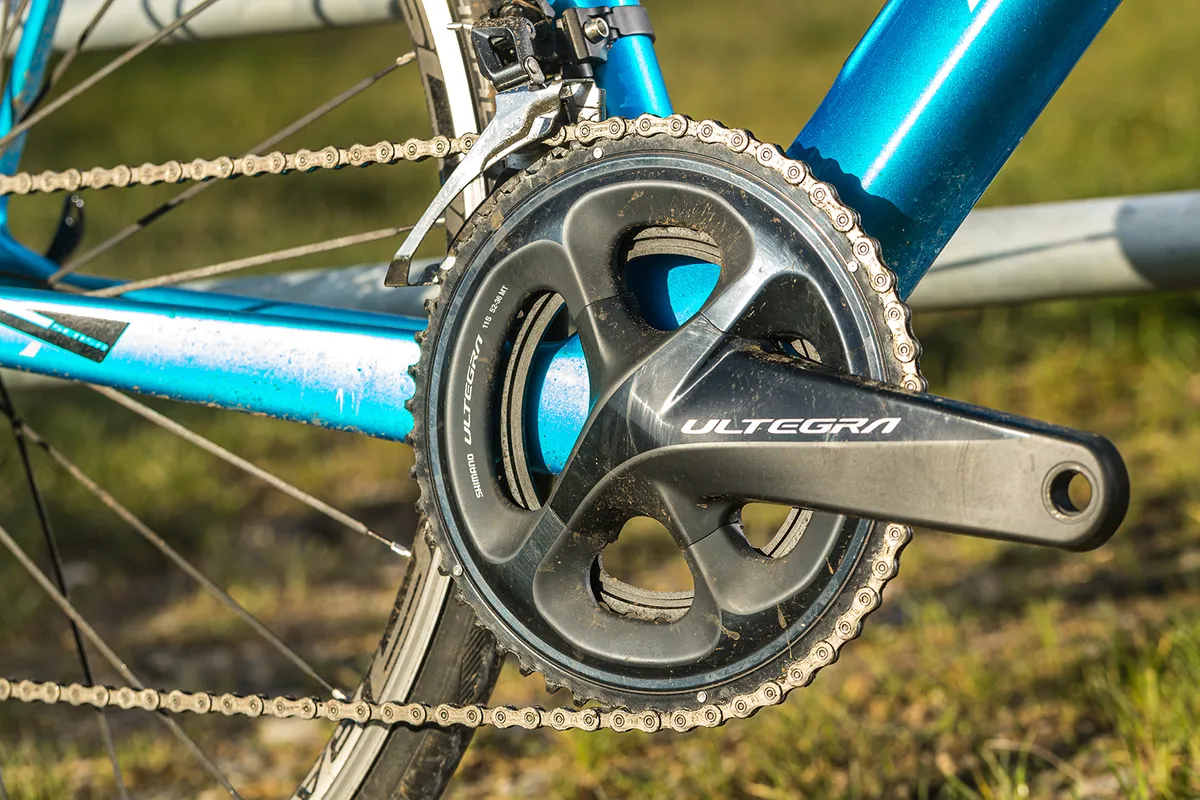Dutch brand Sensa is exclusive to Merlin Cycles in the UK and it has forged a reputation over the years for aggressively priced bikes that can compete with some of the best brands around. The G3 Evo has a list price of £2,249.99 but Merlin, as exclusive retailer, sells it at £1,999 (at time of testing).
This is the third generation of the Giulia chassis (hence its G3 moniker). I’ve tested both previous models and I’ve been impressed.
The nomenclature can be confusing. The Giulia G3 Evo here is called an all-rounder/Gran Fondo machine, however the Giulia Evo is actually a super-aggressive, bullet-fast aero bike: two very different rides, so make sure you choose the right one or you could be disappointed – or, at the very least, surprised by what arrives.

Sensa Giulia G3 Evo Ultegra frame
The new frameset features the same styling cues as previous models, so that means a huge-volume head tube that tapers to a 1.5in lower bearing, which is all about stiffness to enhance the handling.
The fork, in comparison, is a slender design to provide some compliance. With a triangulated cross-section, the fork legs gently taper down to minimal quick-release dropouts. This is, after all, a rare beast: a new performance bike with rim brakes.

The oversized down tube is also triangular in profile and flows down to a high-volume bottom bracket (BB) shell that houses a Shimano PF86 BB.
The top tube arches and tapers towards the seat tube continuing into minimally sized, gently bowed seatstays that meet the rear dropouts and substantial rectangular chainstays.
The chassis is all about splitting the performance of the frame. If you drew a line from the top of the head tube down to the rear dropout, everything below that line is designed to be as stiff as possible, while everything above it is manufactured so as to allow a little comfort-giving flex.

Sensa Giulia G3 Evo Ultegra geometry
The geometry is what I’d describe as ‘classic racy’: parallel 73-degree angles and a 42mm-offset fork, which, when combined with the head angle and 25mm tyres, make for quick steering.
The 590mm stack is lower than your average 58cm endurance bike but not race-bike slammed. The 390mm reach is a little shorter than race-bike spec.
However, Sensa’s long 120mm stem means it does afford a more aggressive position than frame numbers alone would suggest.
| | 50 | 53 | 55 | 58 | 61 |
|---|---|---|---|---|---|
| Seat angle (degrees) | 74.5 | 74 | 73.5 | 73 | 72.7 |
| Head angle (degrees) | 72 | 73 | 73 | 73 | 73.5 |
| Chainstay (cm) | 41 | 41 | 41 | 41 | 41 |
| Seat tube (cm) | 46.7 | 50.3 | 52.2 | 54.1 | 56.4 |
| Top tube (cm) | 52.3 | 54.2 | 55.9 | 57.5 | 59.1 |
| Head tube (cm) | 11.2 | 14 | 16.1 | 18.1 | 20.1 |
| Fork offset (cm) | 4.5 | 4.5 | 4.5 | 4.5 | 4.5 |
| Bottom bracket drop (cm) | 7 | 7 | 7 | 7 | 7 |
| Wheelbase (mm) | 976 | 982 | 884 | 1,005 | 1,012 |
| Stack (cm) | 52 | 55 | 57 | 59 | 61 |
| Reach (cm) | 37.9 | 38.4 | 39 | 39.5 | 40.1 |
Sensa Giulia G3 Evo Ultegra ride impressions
With a 52/36 crank and 11-28 cassette combination, the Ultegra drivetrain sits in the middle ground between race and endurance. It’s a decent range but in the era of easiest sprockets that are generally in the 30s, to some it may be a bit tall.
What you do get is a more closely spaced set of ratios, which makes the Giulia brilliant at covering flatter or rolling terrain at real pace.

The ride is undoubtedly firm. The big, sturdy frame tubes, large-diameter 31.6mm alloy seatpost (I’d consider swapping to more forgiving carbon) and 25mm tyres don’t do much to alleviate the feel, but contact points are excellent – thick, soft and sticky bar tape and a brilliantly comfortable San Marco Shortfit saddle.
There’s no friction at the front end, thanks to its stubby nose. This means you can use the drops and extra length afforded by the stem to good effect, getting down low for a more aero-efficient position.

Rim brakes on alloy rims is the best combination for its type. Braking is good but lacks precision in the wet, though this is true of all tim brakes. Under sprints or power climbs I got some brake-pad rim rub at both ends, something not felt on any of the disc-equipped bikes I also had on test.
The Supra RA30 wheels are nicely put together with slender cartridge bearing hubs and aerodynamic bladed spokes (24 per wheel). Their medium weight of 1,890g per pair is fine, though the responsive chassis would be enhanced by lighter hoops.
I’d be tempted to invest in some lighter, Sunday-best wheels and run the RA30s as a training set. However, Sensa hasn’t skimped on the tyres by fitting Schwalbe’s excellent One Performance, which worked particularly well in challenging weather.
How we tested
When it comes to performance road bikes, it’s very easy to be blinded into thinking you need to buy a pro-peloton bike with glamorous cutting-edge design and top-of-the-line components.
For most of us, bikes like that are simply out of reach and, in reality, you really don’t need to spend huge amounts to get a great performing bike straight out of the box – one that you’ll cherish and even want to upgrade further down the line.
So we've selected four bikes costing between £1,999 and £2,600, a far more achievable budget for many of us, and put them to the test on our local roads.
Also on test
Product
| Brand | sensa |
| Price | 2675.00 EUR,1999.00 GBP |
| Weight | 8.3100, KILOGRAM (58cm) - |
Features
| Fork | Supra Full Carbon |
| br_stem | Supra Speed Line alloy 120mm |
| br_chain | Shimano Ultegra HG-701 11-speed |
| br_frame | Monocoque G5 carbon fibre |
| Tyres | Schwalbe One Performance 25c |
| br_brakes | Shimano Ultegra R8000 rim brake |
| br_cranks | Shimano Ultegra FC-R8000 52/36 |
| br_saddle | San Marco Shortfit |
| br_wheels | Supra RA Pro |
| br_headset | Supra |
| br_shifter | Shimano Ultegra R8000 |
| br_cassette | Shimano Ultegra CS-R8000 11-28 |
| br_seatpost | Supra Speed Line alloy |
| br_handlebar | Supra Speed Line alloy 440mm |
| br_bottomBracket | Shimano PF86 |
| br_availableSizes | 50, 53, 55, 58, 61cm |
| br_rearDerailleur | Shimano R8000 |
| br_frontDerailleur | Shimano R8000 |

